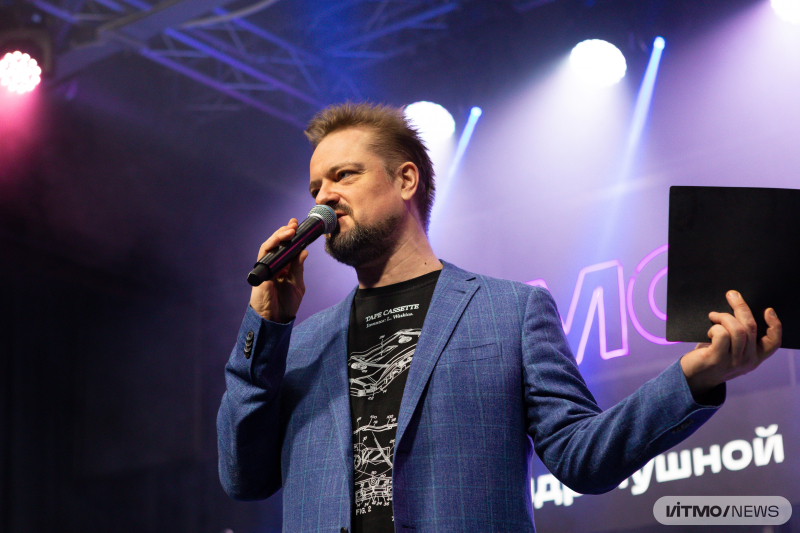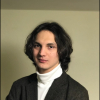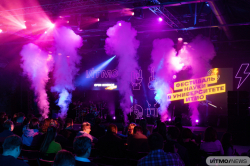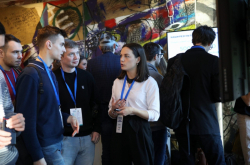Alexander, we’re glad to see you at our most non-classical of scientific and the most scientific of non-classical conferences. It’s not that common to see science and rock come together. How do you find the format?
Well, to be fair, rock here is just the icing – and science is the cake. And it’s indeed a scientific conference. I’m happy to see that here, people don’t simply report on their research but also explain how it can benefit the world around us.
I’m a fan of everything future-related, be it foods or technologies that can move, say, medicine forward. All the topics mentioned were rather relevant; I especially enjoyed the presentations given by students.
When I was their age, I happened to experience a true turn of age in terms of technology. Just 50 years ago, a smartphone – like the one you’re holding in your hand and recording this interview with – was a thing of fantasy. On the one hand, it’s a recorder. On the other – a machine with the combined power of all the computers used in the Moon landing. Even fairly recently, this would have been hard to imagine. Yet we, somehow, adapted to these new technologies, and the students that spoke on stage today are destined to create – and live in – a whole new future world.
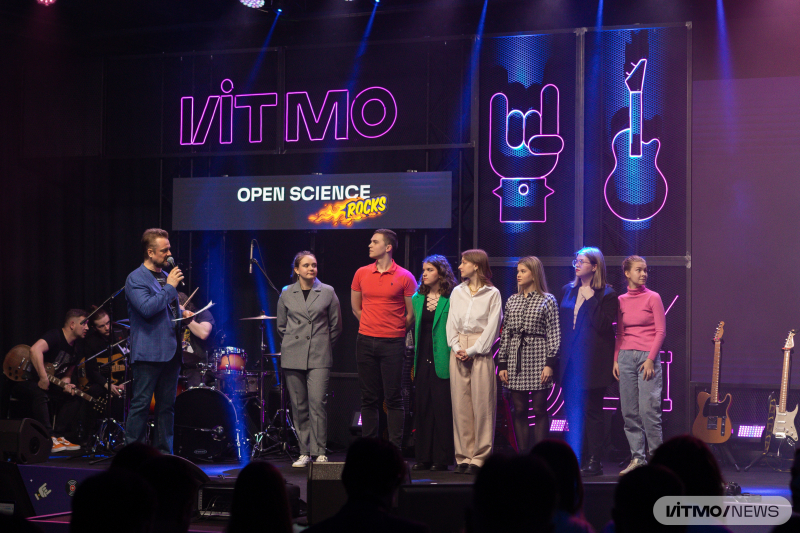
Alexander Pushnoy with participants of the ITMO Open Science Rocks’ Guitar Solo section. Photo by Dmitry Grigoryev / ITMO.NEWS
With ChatGPT and other IT advances being all the rage, it seems that we’re in the middle of another turn of age. Many people even sign open letters asking to pause the training and spread of these novel technologies. What do you think about that?
I mean, look, you’re now hearing what I’m saying, although what I’m basically doing is generating sound waves. Now, let’s think about what’s going on inside your recorder. The sound waves I create hit a membrane in your gadget, which starts to oscillate at a similar frequency and then passes this frequency as an electric oscillation further along. What happens next? After that, the oscillation is digitized, meaning that each wave value is assigned to a certain number, a big one, like 24 or 32 bit. At a tremendous speed, these numbers are forming a kind of an array, which is then recorded. Where will it go? Into which memory cell? You don’t know all these things. All you know is there’s a device in your hand and you’ve just pressed “Record.” There’s a great many processes happening right now, but they’re not relevant to us.
Once you get your recording, you will turn it on and try to decipher what I’m saying, which will take you some time. That said, I vote for letting AI do the jobs we don’t want to be bothered with or don't want to spend our time doing. A vast amount of work, including the intellectual kind or, if more precisely, intellectual routine, is performed by humans. What we could do instead is delegate some non-demanding tasks to robots and do the more intellectual ones ourselves. Why would a programmer need to know Assembly when they have C++? Although C++ isn’t that high-level anymore, either.
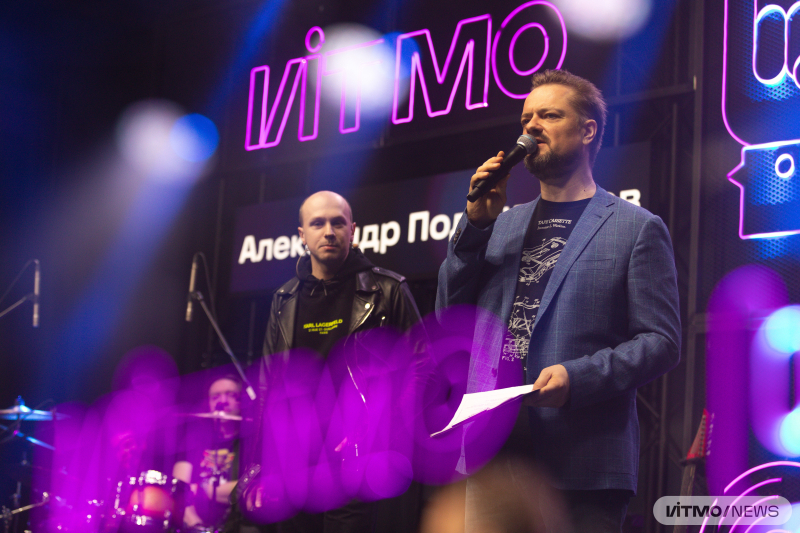
Alexander Pushnoy at ITMO Open Science Rocks in St. Petersburg. Photo by Dmitry Grigoryev / ITMO.NEWS
I can’t help but ask you about science popularization. In one of your interviews, you classified Galileo as “sciencepunk” – and that was the format that brought children to screens every time your show aired. They obviously enjoyed the experiments you did more than the ones they had to do in class.
As I came to realize, they saw me as their buddy – someone who came to blow something up and it’d be awesome. They didn’t want to go to their moms or dads, or their teachers; they wanted a buddy, and that is what I became for them.
But can we make them as excited about physics classes as they are about the show? Is it even possible?
First of all, you have to understand that whether you call it sci-punk, pop-sci, or even rock-sci, it is still sci-something: a way to make science accessible. I’ve never been in favor of people using Galileo episodes as textbooks. It made science appeal to a wider audience, and it was really good at it. However, actual education requires a whole other level of immersion.
The goal of wrapping paper is to look good and attract attention, but it’s not really valuable without the gift that’s inside. At the end of the day, Galileo was simply great packaging. But those who saw the show when they were kids then went on to attend schools and universities, and many of them are now here at the festival. I am convinced that they couldn't have achieved this if Galileo was the entirety of their learning.
We never aimed to substitute education. But educators also shouldn’t turn their noses up at Galileo’s format. Instead, they should use TV to their advantage.
In fact, let me tell you a story. When we first came up with the Experiments segments of our show, we approached the Moscow Institute of Physics and Technology with an offer to film the segment there, using their equipment. “No way, why would we even want that?” said the professors there. “Look, we are a serious institution with expensive equipment.” So, we shrugged and went on our way. Back then, we didn’t know if our idea was any good, but reaching out was important to us. We even offered to tell the viewers each episode that the experiments were filmed at MIPT.
Could you even imagine the sort of positive PR that would’ve been generated for MIPT if all our experiments were shot there? It would have been more effective than any ad campaign. But they had no idea that our show would become this successful. Academia is generally suspicious of popular science. I think that it is somewhat understandable: even now, a lot of pseudoscientific hoaxes and frauds are out there.
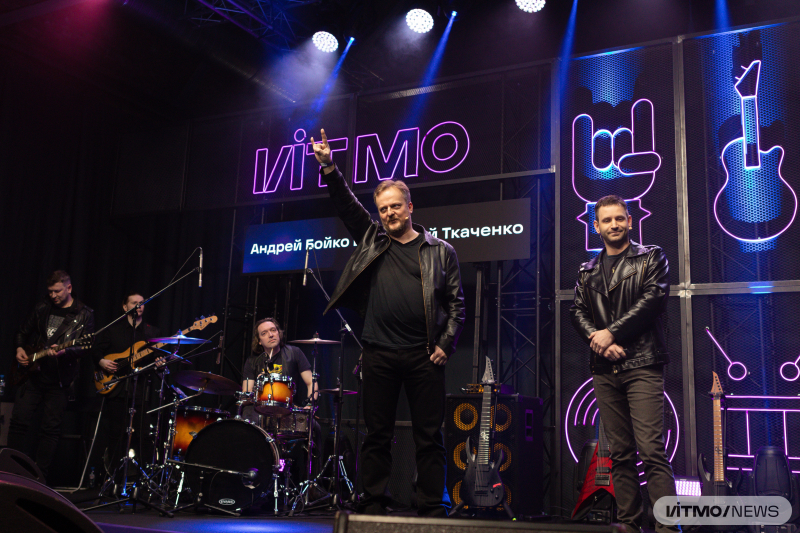
The ITMO Open Science Rocks conference in St. Petersburg. Photo by Dmitry Grigoryev / ITMO.NEWS
Nevertheless, it seems that academia has grown a bit closer with popular science in the ten years since you left Galileo. Have you noticed this trend, too?
Yes, of course. Behaving in any other way is a losing strategy. Academia is certainly interested in attracting more young people. While some people are determined to go into STEM, and others are 100% sure to choose the humanities, that leaves a lot of prospective students that are hesitant. And academia, just as any other institution in need of new recruits, wants to seem more appealing.
That is why formal science is also moving towards greater transparency and newer formats. Actually, this very festival is a great example: we make a conference less boring by throwing some rock music in the mix. It is neither a full-on concert nor a classical conference, but in this case, it is to our advantage.
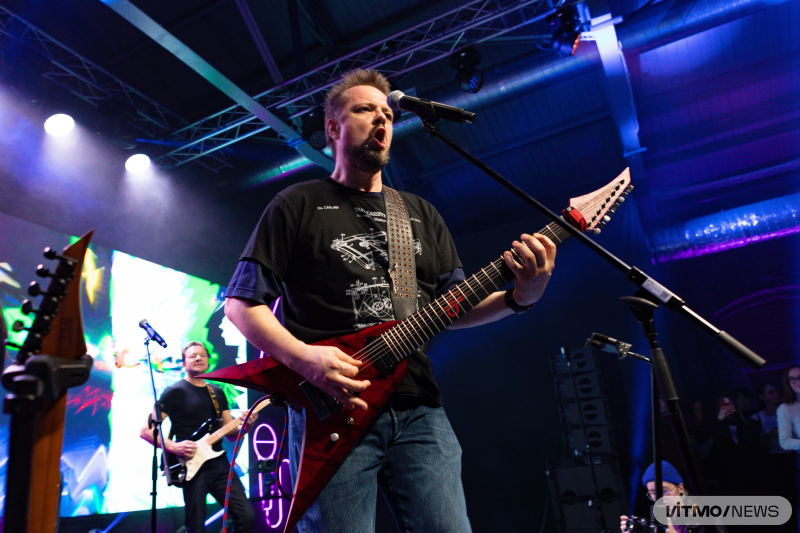
Alexander Pushnoy during the final of the ITMO Open Science Rocks conference. Photo by Dmitry Grigoryev / ITMO.NEWS
Yet it still seems like popular science is a niche thing that will never achieve the massive popularity that other genres enjoy. You have stated that Galileo could never compete with any prime-time talk shows in ratings. Is there any way at all for it to enter the mainstream?
At any given time, a talk show will be more popular than a popular science program. But the former has much less long-term appeal. Galileo ended 10 years ago. Really, think about it – not five minutes, not five days, but 10 years! And yet kids are still watching it, not even minding its ancient 4x3 aspect ratio and slow pace. What does that mean? It means that if the content is well-made, it will stand the test of time. After all, understanding the world through science will always be relevant.
Things that have a tinge of controversy to them may have higher ratings in one given moment, but as soon as that controversy is gone, so is the viewership. With all respect to Russian talk shows from 2013, I can’t imagine anyone downloading and rewatching them today. So, the key to success is to do your own thing and do it well.
